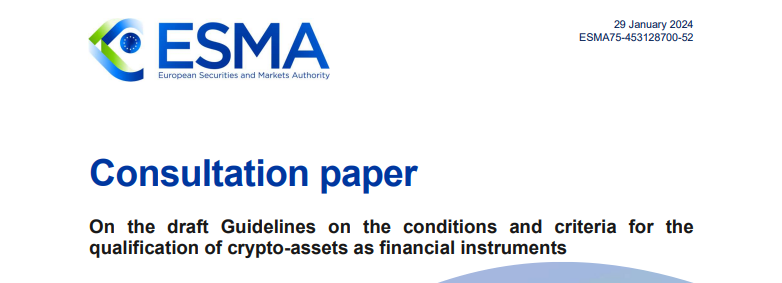The European Securities and Markets Authority (ESMA) is stepping up its efforts to regulate the burgeoning cryptocurrency market with two key initiatives: establishing criteria for classifying these asset types as financial instruments and setting stricter rules for non-EU companies operating in the bloc.
These moves come in response to the rapidly growing European crypto market, projected to reach $19 billion by 2028, and increasing calls for regulatory clarity. The landmark Markets in Crypto Assets (MiCA) regulations passed by the European Parliament last August laid the groundwork, and ESMA is now filling in the crucial details.
Classifying Crypto Assets: Unveiling The Securities
One of the biggest challenges in regulating crypto is determining which assets fall under existing financial regulations. To address this, ESMA is seeking public input on defining clear criteria for classifying digital assets as financial instruments. This crucial step aims to provide investor protection and market stability by placing these assets under appropriate regulatory frameworks.
#ESMA publishes 2⃣ Consultations Papers on guidelines under Markets in Crypto Assets Regulation #MiCA:
on reverse solicitation
on the classification of crypto-assets as financial instruments
Send your comments by 29 April 2024https://t.co/PEosx4t3UO pic.twitter.com/v31nWMUEcu
— ESMA – EU Securities Markets Regulator
(@ESMAComms) January 29, 2024
The proposed criteria focus on whether a crypto asset represents a digital right or value stored on a Distributed Ledger Technology (DLT) platform. Additionally, the asset’s relation to an issuer would be considered, differentiating between simple digital representations and those akin to traditional securities.
Leveling The Playing Field
ESMA is also aiming to ensure a level playing field for European digital currency companies by cracking down on non-EU firms operating in the bloc. The proposed regulations significantly restrict “reverse solicitation”, where customers initiate contact with non-EU firms. This practice, often used to circumvent existing regulations, will be closely monitored, and active marketing campaigns by non-EU firms within the EU will be explicitly prohibited.

Furthermore, non-EU firms will be limited in the services they can offer within the bloc. They will be restricted to fulfilling the initial transaction initiated by the customer and prohibited from expanding their services beyond that specific context. This safeguard ensures fair competition for EU-based companies and prevents non-compliant entities from exploiting loopholes.
Public Consultation And The Road Ahead
Both the classification criteria and the non-EU firm restrictions are currently open for public consultation until April, allowing stakeholders to voice their concerns and suggestions. After careful consideration of public feedback, ESMA expects to finalize both sets of regulations by the end of 2024.
These initiatives mark a significant step forward in Europe’s journey towards comprehensive crypto regulation. Establishing clear classification criteria and stricter rules for non-EU firms will contribute to a more transparent and responsible crypto market, protecting investors and fostering sustainable growth within the bloc.
Featured image from iStock, chart from TradingView














